"CRAFT TOURISM ECHIZEN" What is the charm of “Chinese soba” that captivates those who eat it?

"Chuka soba" that captivates those who eat it was a legacy of Echizen City known to those in the know
Chinese noodles
Speaking of gourmet food in Echizen City, Echizen grated soba noodles are well-known nationwide, but in fact, “Chinese noodles” is also one of the lesser-known specialties.
It is a little different from what is served at so-called Chinese restaurants and ramen shops. The point is that it is a menu written as "Chinese soba" in soba restaurants and public dining halls.
There are nearly 20 shops serving 'Chuka soba' around JR Takefu Station, which is also called 'Takefu Ekimae Chuka Soba'.
The light, clear soup is also perfect as a finishing touch after drinking alcohol. In Echizen City, a group of volunteers called "Nukumori Ippai Chuka Men's" is quietly gaining momentum.
What is it about “Chinese noodles” that attracts so many people?
special menu
Chinese soba was a pleasure to eat out
The noodle dish that is the root of ``Chuka soba'' came to Japan from China around the end of the Meiji era. At that time, it was called ``Nanjing soba'' or ``Shina soba'', but in Japan, where there was originally a culture of soba and udon noodles, the taste spread quickly, and in the Taisho era, it was called ``Chuka soba'' nationwide. It spread.
Udonbo Yamamuro, located about five minutes by car from JR Takefu Station, is one of them. Founded in 1912 (Taisho 2), it has filled the stomachs of many people for over 100 years. In addition to Echizen oroshi soba, udon, and rice bowls, “Chinese soba” is also a long-established menu item.

▲The eye-catching red bricks
“In the old days, there weren’t many shops that called themselves ‘soba restaurants.’ You can get soba anytime if you go to the fields around here. Udon and Chinese noodles were far more rare.”
says the owner, Tetsuo Sasaki. It is the third generation since my grandfather's generation.

▲ Mr. Sasaki. His behavior is beautiful because he practiced traditional arts until he was 60 years old.
There were no supermarkets or convenience stores like today. There are few places that sell raw noodles other than soba, and it was troublesome to make the noodles at home. Therefore, Chinese soba was a special menu that could only be eaten at restaurants.
“This area used to be like Kasumigaseki, where government offices were lined up. I remember there was a big sign that said,
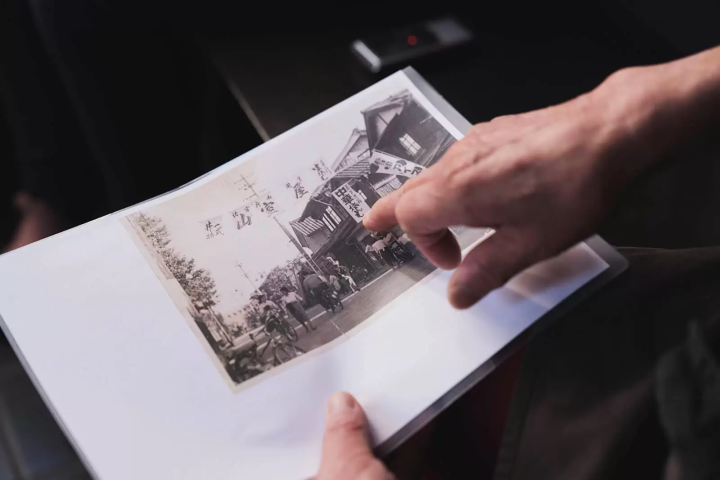
▲Photo of Yamamuro more than 60 years ago. You can see a sign that says "Chuka soba" on a banner that says "Purveyor to the Government"
In the 1950s, there was an instant noodle boom, and from there the name “ramen” spread throughout the country. To this day, various types of ramen, such as tonkotsu and miso, have been created, but why is 'chuka soba' gaining more citizenship in Echizen City?
Soba soup and homemade char siu
A soup that captivates the eater
Ramen soup is basically made by pouring glass soup made from boiled pork belly or chicken bones into a “kaeshi” made from grilled pork broth, soy sauce, and mirin. Use soba sauce instead of kaeshi.
“In order to make soba and udon, the restaurants around here make sure to use dashi stock made from bonito and kombu seaweed every day. is different from ramen."
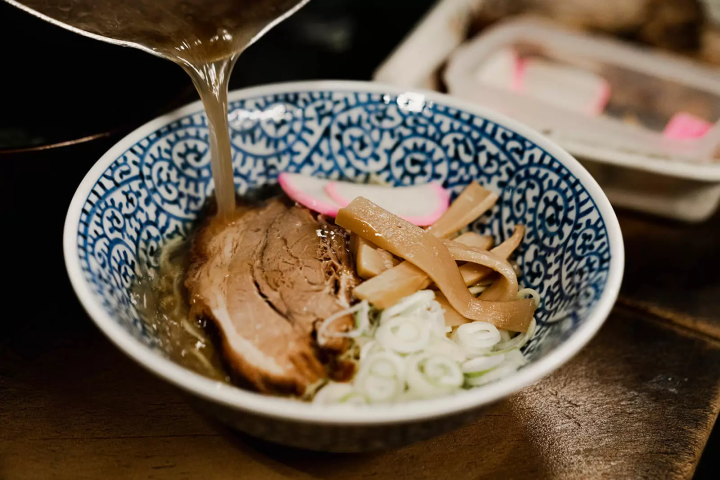
The Chinese soba you want is brought to you. The scent that fills your nostrils as soon as it is placed on the table stimulates your appetite. Chinese soba ingredients are green onions, bamboo shoots, kamaboko, and chashu. Many restaurants in this area use traditional ham instead of chashu, but Mr. Sasaki prepares the chashu over a whole day.
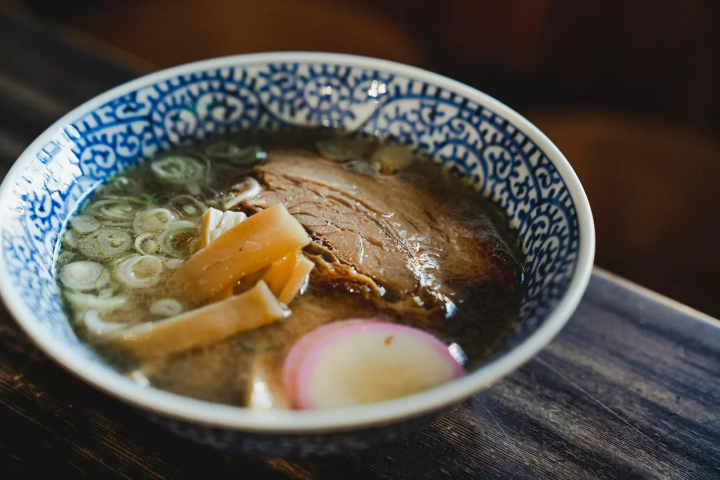
▲ Yamamuro’s “Chinese noodles”
Taste that suddenly comes to mind
A nostalgic taste that you want to eat every day
“When you take a sip of the soup, you will be surprised by the refined and refreshing taste that is different from ramen. is increasing further.
And the softness of this char siu. It's surprisingly smooth, probably because the excess fat is removed and it's slowly simmered.

▲“Chuka soba takes a lot of effort and time. But as long as there are people who come to eat it, I can’t stop,” said Mr. Sasaki.
“You might get tired of eating ramen every day, but you won’t get tired of this Chinese soba every day. Just like miso soup, you can drink it every day because it is based on dashi stock, and I think it has a nostalgic taste.”
In fact, Yamamuro's "Chuka Soba" has many long-time fans, and it is said that there are people who come from Shiga and Aichi to eat it every month in search of this taste.
The familiar taste of the soup, which is infused with the umami of kombu and bonito, gently fills your stomach at any time. Echizen City's "Chuka Soba" is a food legacy that we want to leave behind forever. By all means, please visit various shops and find your favorite cup.
▼Udonbo Yamamuro
Echizen wisdom ~Proposing a new tourism, a journey of wisdom.~ A town that has inherited the skills and spirit of its predecessors for 1,500 years. Echizen, the entrance to the "Koshi no Kuni" ruled by an ancient king. A place of wisdom where cutting-edge technology and culture first flowed in from across the Sea of Japan and became the origin of Japan's profound manufacturing. In the traditional industries that coexist with the nature of the land and in the people who live here, the universal wisdom that human beings want to bring to the next 1000 years is alive. Here and now, there is a future born from exchanges that transcend national borders and time and space. A new quest to find light. Welcome to Echizen.
The contents on this page may partially contain automatic translation.


![[2025 Edition] Best Places to See Cherry Blossoms in Fukui, Japan – Top 10 Spots for Hanami & Stunning Views](https://resources.matcha-jp.com/resize/720x2000/2023/03/09-135755.webp)



























![[During Your Kumano Trip] Cape Shionomisaki Tourist Tower](https://resources.matcha-jp.com/resize/720x2000/2025/11/05-249097.webp)
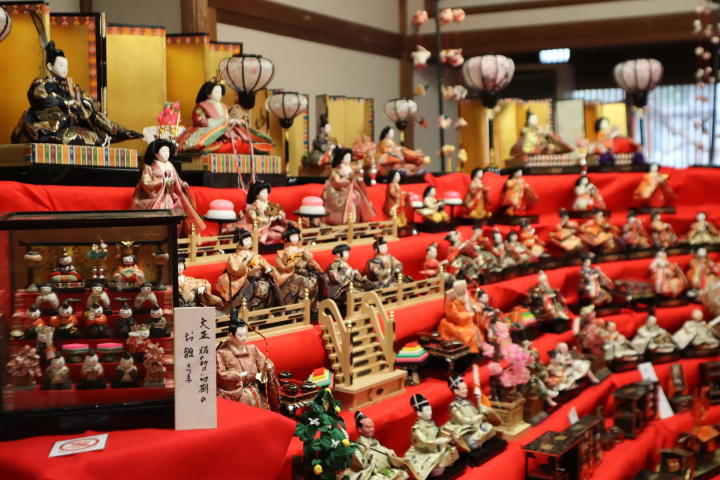
![[Kagoshima] Enjoy Minamisatsuma City to the Fullest! A Guide to the Scenic Beauty and Culture of Five Areas](https://resources.matcha-jp.com/resize/720x2000/2026/02/15-258755.webp)
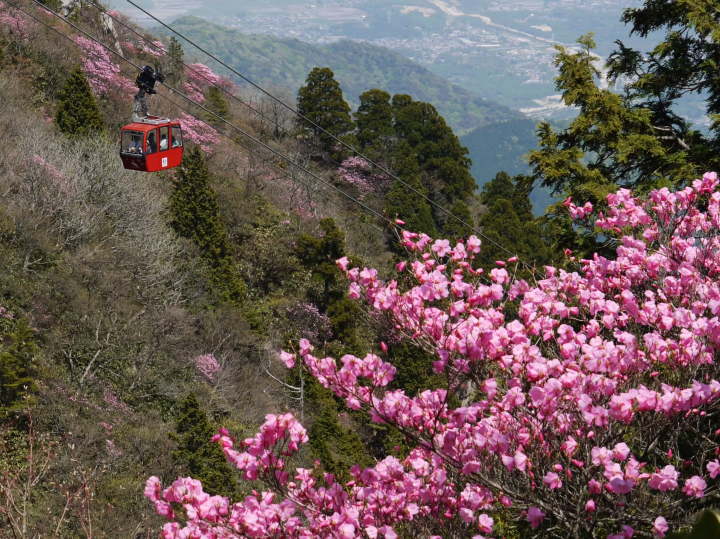
![[Yufuin]Yufuin in 100 Minutes: Quick Access Guide](https://resources.matcha-jp.com/resize/720x2000/2026/02/15-258738.webp)